Caroline Leavitt's Blog, page 125
June 24, 2011
In which I talk about parallel universes and persistence
I talk to Cindy Teruya at The Los Angeles Examiner about writing, never giving up and parallel universes!
Published on June 24, 2011 08:13
June 20, 2011
Emily Gray Tedrowe, author of Commuters, talks about writing and dreams
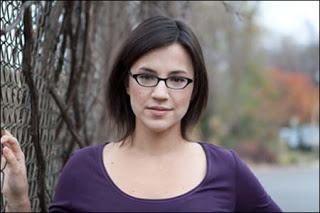
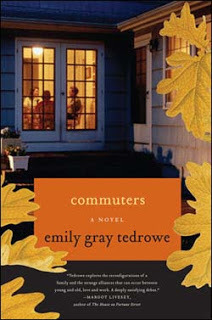
Emily Gray Tedrowe wrote a really knockout novel: Commuters. A Target Breakout Pick, An Indie Next Pick and an Entertainment Weekly "Best New Paperback," this is an assured debut about marriage, money and home, and it is also very much a book about what we yearn for and dream about--and why. I asked Emily if she'd write something for the blog, and I'm so thrilled that she did. Thank you so much, Emily.
One night earlier this year, as I was closing in on a full draft of my second novel, I dreamed that I showed the manuscript to the characters in the novel. As in most dreams, this had the sense of perfect plausibility. In the dream, I received praise and feedback from my characters with a polite but privately skeptical attitude I'm afraid I take on for real-world critiques. . . and was shocked when one character broke away to denounce the novel entirely. Awake, I turned the dream over and over, trying to find a key to help the actual writing of my book which was in full-steam, light-at-the-end-of-the-tunnel mode. Friends and fellow writers were amused by my dream about the dissatisfied character: kill him off, they advised. Rethink giving him a weight problem. Eventually I decided that the medium was the message—I cared so deeply about these people (characters) and was so caught up in their story, that I couldn't leave them even while unconscious. A good sign. But I've often wondered before this about the relevance of dreams to my writing life. Fortunately or not, depending on how you look at it, I usually remember my dreams each night. I write them in my journal, tell them to my therapist, bore my husband with them. But what can one's dreams mean to a writer? Aside from the fun of psychoanalyzing yourself, why pay attention? A few thoughts:· Dreams reveal your imagination. Freud famously compared the way dreams work to the structure of poetry, with condensing, metaphor, and substitution as key elements. I like to extend this to fiction, and play with the notion of my dreams as mini-fictional engines. I think about them in terms of mood, point of view, conflict, dialogue. Writers in the flow of creating often experience their work as if it arrives without conscious effort; by eavesdropping on my dreams, I try to catch my imagination unawares and learn more about what it's got going on.· Give a dream to a character? So far I've only done it once, in a short-short story I built entirely around a favorite dream about a hungry ghost. There's a fiction-workshop truism that for every dream you lose a hundred readers. You're warned off at all costs, and sure, we can guess why—too-obvious reveals, banal stand-ins for character development, etc etc. But I must admit that any time a conventional-wisdom "rule" comes my way I immediately want to break it. If you've got the chops, it's not your rule. · Dreams remind you to honor what's unexpected. I once read Ann Beattie urging writers to open up their scenes to sudden swerves; the example she gave is a scene in which a couple is arguing—what if a bird flew inside through their open window? Dreams also return us to the beauty of what startles. So even if I don't write about that dream where my yoga teacher suddenly produces a giant foam cheese slice for the class to practice savasana underneath—true dream—it might jar my work open to the power of the unexpected, the funny, the messy ways of life.
Published on June 20, 2011 17:07
June 16, 2011
Susan Schneider talks about The Wedding Writer and the wedding biz
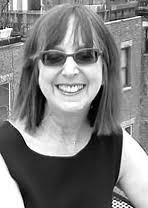
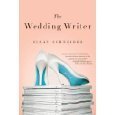
When I first met Susan Schneider, I felt like we had been friends forever--that's how warm and funny she is. It fascinated me that she had worked for years in the bridal industry, and when I found out she had written a book based on her experiences, that intrigued me even more! I can't thank Susan enough for being here on my blog and answering my questions.
What's so wonderful about your novel are the you-are-there behind the scenes episodes about how the bridal industry works. All of it true?
Tip of the iceberg! It's a striving, gritty business filled with smart, talented women with agendas. The wedding magazines historically were huge, slumbering cash cows. With the Internet everything changed—print advertising took a great big hit. A couple of years ago Conde Nast folded Modern Bride and Elegant Bride, and many, many accomplished editors (old friends of mine) were thrown out of work. What does an out-of-work bridal editor do when she gets "divorced' from her job? But even before the Internet and the recession, things could get really scary. When I was at Modern Bride, the editor in chief brutally fired the long-time fashion editor, a brilliant, iconic woman beloved in the industry who was also the sole support of two children. How could one woman, also a mother, do that to another? Issues of power and control, what else? Behind the veil lurk nasty power struggles as well as deep and meaningful friendships between women working together to create a beautiful product.
What was it like for you working in the bridal industry for so long? I see you have some great blurbs from the industry but do you think there are some things about it the industry would rather keep secret?
I saw weddings get more and more elaborate and expensive—I saw women with modest means trying to emulate celebrity weddings and the weddings of the wealthy. Yikes! I understand the desire to be beautiful and admired, but as a deep-down feminist I also wished that more women could be like those who call a time-out and say, "Hey, my having or not having this $10,000 dress will neither make me or break me as a human being." Many of us tried to reassure engaged women that they really don't have to have a "perfect" day—in fact there is no such thing! But bridal editorial is always slanted toward the notion of "perfection." Achieving your day of bliss. It leaves in its wake lots of overwhelmed, confused, anxious women in white dresses who've spent too much money and still wonder if they failed.
I also loved the way you dissected office politics (which really can occur anywhere, not just in the bridal business). Would you say that in many ways working at an office is like a marriage of sorts? (Some happier than others?)
That is so true! The specific dynamic at bridal magazines and indeed all women's magazines is that those "marriages" are played out between women. I've always been an executive editor to the editor in chief, so my role was "wife." With one editor the "marriage" totally failed; we got a divorce! In another I became an enabler—another eventual divorce. In a way an office is just a backdrop against which people act out their family or marital issues—that's why office politics can be so murderous.
What is your writing life like?
For me it's been quite a struggle. As a single working mother, I had to raise a child in NYC and also bring home the bacon. Then my daughter grew up and out of the house and other things in my life got a bit easier. But I can't write if: I'm worried about my daughter or I'm worried about money. Or if I'm worried about a relationship with a man. Life interrupts writing all the time, and you can't do much about that, but I do try to keep on an even keel. I don't need the "perfect" environment—the little cottage in the woods—I just need relative peace and financial security. And oh boy, thank God for aging! Your life gets pared down and you can focus better.
What's obsessing you now?My rooftop garden on West 80th Street. How I love it! It is so critical for city people to find some way to be with nature. Even if it's just a houseplant you like, you need to commune with it everyday.
What question didn't I ask that I should have?This covers it nicely for me.
Published on June 16, 2011 09:43
June 9, 2011
Pictures of You is a Top, Smart Summer Read from the Minneapolis Star Tribune, Self, O: the Oprah Magazine and more!
Ah, summer. Books get packed into your beach bag right along with the sunblock (or, if you aren't a beach baby, they get tucked in your bag to read on the subway!) Pictures of You came out last December and I'm honored and thrilled to report that it's a Top, Smart Summer Read from The Minneapolis Star Tribune, Self Magazine and O: the Oprah Magazine and GolocalProv.com ! Ya hoo!
Published on June 09, 2011 09:56
Pictures of You is a Top, Smart Summer Read from the Minneapolis Star Tribune and Self Magazine
Ah, summer. Books get packed into your beach bag right along with the sunblock (or, if you aren't a beach baby, they get tucked in your bag to read on the subway!) Pictures of You came out last December and I'm honored and thrilled to report that it's a Top, Smart Summer Read from both The Minneapolis Star Tribune and Self Magazine! Ya hoo!
Published on June 09, 2011 09:56
June 6, 2011
Sharyn Wolf talks about Love Shrinks: A Memoir of a Marriage Counselor's Divorce
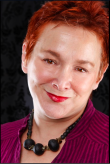
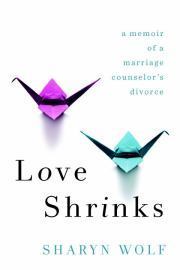
What happens when a marriage counselor's marriage hits the rocks? Author Sharyn Wolf, a marriage counselor and psychotherapist practicing in New York City, writes about it in Love Shrinks: A Memoir of a Marriage Counselor's Divorce." I asked Sharyn if she'd write something about that here, and I'm thrilled she said yes. Thank you, Sharyn!
Love Shrinks: a memoir of a marriage counselor's divorce By Sharyn Wolf
Writing "Love Shrinks" was a scary proposition for me. I've been a marriage counselor and psychotherapist for twenty years, and it has been my job to listen. It has never been my job to tell. And, this book is about my divorce. It's all about telling—all about revisiting a painful past.
In the 90's I had a career as a "relationship expert." I appeared on more than 400 television and radio shows including eight visits on Oprah. People looked to my perky, upbeat advice on how to stay lovers for life, and they seemed to like my funny delivery. I was one the one who said, "The problem is the place you start working; not the place you stop working." And, "When you have the energy to throw him out of the window, you can use that same energy to make love work." The truth is that while I was delivering all these sassy sound bites, I was going home every night to a failed marriage of my own.
We couldn't cooperate to buy furniture for our home. We didn't share meals. We had sex three times in thirteen years. It was shocking. The better I got on TV and as a psychotherapist, the worse my home life became. I was freaked out because I was living such a lie.
I came to realize that my evangelistic fervor to help others was really an attempt to help my own marriage. I was desperate for it to improve. But, no matter what I said or did at home (I tried all of my own advice on my husband), nothing helped. Still, I couldn't leave this man for so many reasons.
He was the man who danced me across the living room floor in my pajamas while the stereo played the love theme from "Beauty and the Beast." He was the man who climbed into bed with my dying aunt when she said she wanted to rest her head on his belly. He was the man who gave me his silly mosquito net hat when we were hiking, and I forgot to bring mine.
And yet, he was the man who never read a word of one of my books no matter how much I begged. He was the man who would not listen to me talk about my work no matter how much that meant to me. He was the man who got shoe polish all over our new white couch and refused to put a cover on it or take off his shoes.
After fifteen years, I stepped out of the grey landscape of my marriage, and I filed for divorce. It was messy. It was long. It was a pity. I now receive another kind of media interest that isn't as much fun; I am the marriage counselor who couldn't keep her own marriage intact.
Published on June 06, 2011 06:24
Janice Eidus Writes about My Sibling/Myself

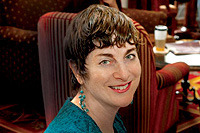
I'm thrilled to have a guest post from Janice Eidus today. She's a novelist, short story writer, and essayist and not only that, she's twice won the O. Henry Prize, as well as a Pushcart Prize, a Redbook Prize, and many other awards. Thank you so much Janice for being here today!
MY SIBLING/MYSELF: WRITING ABOUT MY SISTER
Almost 20 years ago, my older sister, Alice, died of chondrosarcoma, a rare, disfiguring cancer, before I had the emotional strength to begin to fix our unhappy relationship. She often appears in my writing, however, as I continue to struggle to understand and repair our relationship. In my essay called, "Her True Face," published in "Arts & Letters," I wrote as objectively as I could about her illness and my relationship with her – as objectively as I could, that is, about a sister whose face was disfigured past recognition and who'd once said to me, in a rage, "You will owe me forever, because Daddy has always loved you more than he loves me!" Writing that essay, I lingered on the way she dressed and acted prior to her illness: "In her diaphanous nightgown, her cigarette emitting a lacy trail of smoke, she's the epitome of some long-ago glamour queen." I also wrote of all the times when we were children, and "… she pummeled me with her fists, pulling my hair … telling me how much she despised me."In my comic novel, Urban Bliss, I transformed her. Rather than aim for objectivity, I took the qualities I'd most enjoyed in her and affectionately exaggerated them, including her adoration of all things traditionally feminine, such as diaphanous nightgowns and slim cigarette holders. Maya Bliss, the older sister of the novel's protagonist, Babette Bliss, exclusively wears pink ruffled clothes and lives in an all-pink New York City apartment. Maya Bliss is also the loving, somewhat daffy, mother of a little girl she dresses (naturally) all in pink. Alice never had the chance to be a mother in life, and it felt reparative for me to imagine this wackier version of her taking on that role. In my most autobiographical novel, The War of the Rosens, which takes place in the '60s in the Bronx, I wrote about Alice again, portraying her as an angry, deeply-religious child named May with brain cancer, as well as an obsessive crush on a blond, blue eyed boy in the neighborhood. In reality, Alice wasn't super-religious as a child, although she became so as a young adult, nor did she have any painful, unrequited, obsessive crushes during her childhood as far as I knew (those came later). But making her alter-ego in the novel younger and grappling with a different kind of cancer allowed me to delve as deeply into the truth of our relationship as my nonfiction had – but with a different slant. In fiction, I was able to offer her, and myself, a redemptive ending that we never had in life. In this scene, toward the end of the novel, the younger daughter, Emma, witnesses the dying May at last being kissed by the boy for whom she has yearned: "Emma stands in the doorway, her heart stirred by the sight of May's awkward body gathered in Marvin's golden arms. They are kissing passionately, their bodies entwined, as if they will be together for eons and centuries to come, their love the stuff of poetry and dreams."
Published on June 06, 2011 06:11
May 31, 2011
Patrick Darby Talks About his Fantastic New Indie Bookstore, Novel Places
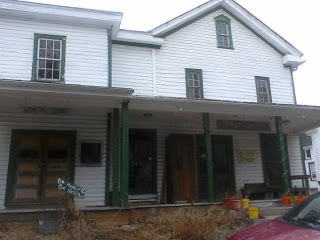
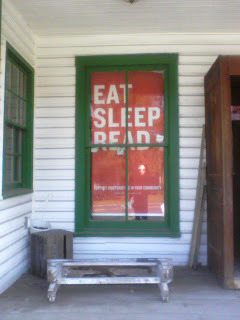
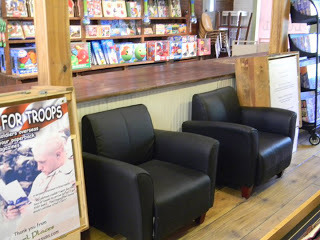
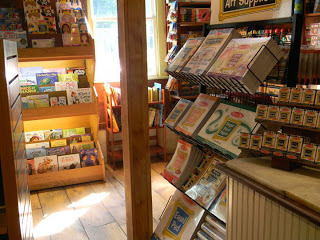
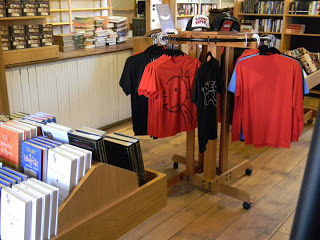
It's always cause for celebration when a new indie bookstore opens and Novel Places is an especially brilliant one. Opened by the fabulously warm and well-read Patrick Darby, this is a store that is going to turn out to be a home away from home for many happy readers and writers. Come visit at 23341 Frederick road in Clarksburg, Maryland. I'm honored Patrick agreed to let me ask him all sorts of questions about his store. Thank you, Patrick!
I'm a huge fan of indie stories. What made you decide to open an indie store?
I've been in the bookselling business for 30 years, but always with chains and university stores. I was frustrated with the corporate attitude of selling, budget, and policy. After my father died, I came to the decision to do bookselling the way I always wanted to do it, which usually got me in trouble with headquarters. As a bonus, when I started Novel Places, my blood pressure dropped 20 points.
And how can I convince someone to open one in Hoboken, where I live? We're just a ten minute subway stop from Greenwich Village, but our bookstore closed a year ago.
They need to know that there's a lot of support in the community. Research will tell them about location and regional access. Find out exactly why the previous store closed. Like those of us opening new stores this year, we can see the hurdles and have plans to compete. Once they know the size and type of the store that can be sustained at the beginning, it's usually an easy choice. Type is very important. I started Novel Places almost 5 years ago. Lease deals fell through, and I ended up online and distributing to coffee shops. When I sublet in a coffee shop in Clarksburg, I quickly realized the mystery and children market needed to be tapped. The new store focuses heavily on children books and toys, but sells all categories, especially mystery.
I love that the book store was the first and the original building in Clarkesburg. So do you ever feel any sense of ghosts around?
The book store is in the original building of Clarksburg. It started out as a trading post, and eventually became a general store. There are no reports of hauntings, but the building has seen Clarksburg rise as the third largest town in Montgomery County, with one of the first academies. It was the stopping point between Georgetown and Frederick. It almost disappeared when the railroad bypassed Clarksburg for the town of Boyds. It came back somewhat with the advent of car travel, but fell back when I-270 was built. In that time, Clarksburg saw George Washington pass through, Andrew Jackson stop at Dowden's Ordinary (another name for a tavern) before his inauguration, Sons of Liberty meet to "discuss" taxes by Great Britain, and the growth of arts and literature. I'm reviving the Clarksburg Literary Society that formed back in 1879. But, back to your question, I do hear what sounds like footsteps on the porch, but there's nothing there when I look. A few strange noises come from upstairs I care not to investigate.
Seriously, though, tell us about some of the antique items you found in the store.
The general store closed a few decades ago, and the building went into disrepair. An antiques dealer used it to store antiques, so when the building was bought by the current owner, a lot of it was chairs, tables, and other furniture. They did find the original counters and curved glass displays from the general store. I picked up a glass voting box (the lid was smashed and poorly repaired), along with the wheel and other items I mentioned before. The counters and glass displays are part of the new store. One unusual item we found was a rack on wheels that has rows of pegs (about 8" long) that didn't have any purpose we could think of. Finally, an antique dealer told us it was a shoe rack for a shoe maker. As the stopping point, Clarksburg's industry became leather, blacksmithing, inns and hotels, that serviced travelers, their horses, and carriages. A tannery flourished for leather goods, including 2 shoemakers near the outside of town. Old maps I have show the locations.
Your grand opening is July 2. What things are in store for lucky readers in your area?
We're already scheduling author signings. Since this is a young community, we're reaching out to daycare centers and families to promote playdates and storytelling. I've had some inquiries about parties, but I need to consider consequences of that. There are more community themed events scheduled, and I will be supporting those events with bands, activities and book related contests. I'm gearing up for ebooks by having education sessions on downloading ebooks and choosing e-readers. I already have a QR-code sign on my sign post by the street. It will have announcements and special ebook downloads available. I've been asked to create seminars for aspiring authors.
How do you see your store growing, and how can authors help?
I've already mentioned a few ideas, but I'm looking for the store to be the town meeting place. Each community here has a center, but this will be the place to catch up on all happenings in Clarksburg, and be a place to discuss books and gather socially. Authors can help by reading and signing books, but also be part of the activities we plan during the year. I believe people will support local independent bookstores more when they see the authors giving back to the store and the community. It's about the partnerships and energy generated through support.
Want to tell us what you're reading and promoting now that you love?
I'm reading so many good books, trying to stay on top of Friday Reads. I pledged to Bethanne I would read one book each week because of Friday Reads. It's a challenge, but I discovered it's possible. I usually took two weeks to read a book, claiming I was too busy. My favorite book to promote right now is The Taker, by Alma Katsu. It's a wonderful, but dark story. I don't want to take away from the excellent books of the authors signing at the store next week, but I'm promoting The Taker because I've met Alma twice and keep in touch with her. She stopped by the store last week, and that stays with me, which encourages me to handsell her book. I will give as much to The Bird Sisters and Silver Sparrow, not because they're signing next week, but because they are great books.
What question didn't I ask that I should have?
Sidelines. I've picked up quite a few sidelines, such as greeting cards, toys, bookmarks, special bookends, etc. It can be a dangerous path. You want to offer book related items to enhance your bookstore, but there are so many items to choose from, you can get things that don't fit a bookstore, but could sell. I'm thinking about back-to-school supplies, but that can rapidly grow into department store size merchandising. Fortunately, budgets help decide what you offer.
Published on May 31, 2011 07:39
Sloane Crosley talks about writing, fame and How Did You Get This Number
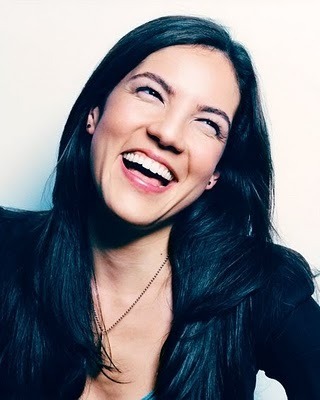
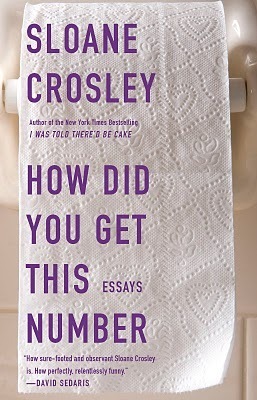
Sloane Crosley is one of the most hilarious people around. HBO has recently optioned her book, I was Told There'd Be Cake for a series, and her new collection, How Did You Get This Number is an even funnier book. (Well, I think so.) I'm thrilled to have Sloane here. Thank you, Sloane!
You aren't working in publishing anymore. Are you losing your mind just working at home--or perhaps, finding it?
Mother, is that you? No, kidding. I'm not losing my mind. It is a very sharp change, sharper than I expected despite everyone's warnings that it would be a big adjustment. I've been doing it for three months now and I'm just starting to shake the feeling that I'm home sick or got laid off. So I've definitely been productive but am slowly starting to realize that it's a pretty awesome thing, making one's own schedule.
I also want to know what it's like to be on the other side of the publishing fence. Are you doing all the things you always wish authors didn't do when you were a publicist?
I think it's more about discovering reading again, as fantastically cheesy as that sounds. I can read anything I want. Because I worked for Knopf and Doubleday, I was hardly confined by what I was reading. It's like oh, poor me, someone locked me in a room for a decade and told me I had only chocolate and cheese and wine to consume….not so rough. But when you're working on so many books, each of which you aim to speak intelligently about…I read about one Little, Brown or FSG book a year. If that. Same thing with attending events. When I saw Karen Russell and Wells Tower read at The New York Public Library Young Lions event in March, it was the first time I had gone to a literary event since I quit my job and it was mind-blowingly enjoyable in a way I didn't even know I was missing by working in book publishing.
So much of your work seems to me to be a love letter to New York City. Could you imagine living anywhere else and why or why not?
Thank you. It's hard to write love letters to a lady who has had, say, several centuries worth of suitors. What can you get her that she doesn't already have, you know? But yes, I could definitely imagine living other places. Certainly abroad but book tour is also a nice American sampling experience. I'm a huge fan of Portland, Oregon, San Francisco and Austin but I think I would miss the clip of New York. Even in LA, I'd miss it.
What's obsessing you now?
I'm doing a lot of larger magazine pieces. So I'm obsessing about those and also a novel.
You've been called the anti-adult. Can you comment on that?
Have I really? No fair. I challenge whomever said that to a kickball duel on the playground at recess.
What question should I be mortified that I didn't ask?
I suppose you could have asked me to spill all sorts of ridiculous stories about authors, inside trade secrets about e-readers and the future of the printed word but alas – it's all in the vault.
Published on May 31, 2011 07:35
May 29, 2011
I'm a huge fan of indie stories. What made you decide to ...
I'm a huge fan of indie stories. What made you decide to open an indie store?
I've been in the bookselling business for 30 years, but always with chains and university stores. I was frustrated with the corporate attitude of selling, budget, and policy. After my father died, I came to the decision to do bookselling the way I always wanted to do it, which usually got me in trouble with headquarters. As a bonus, when I started Novel Places, my blood pressure dropped 20 points.
And how can I convince someone to open one in Hoboken, where I live? We're just a ten minute subway stop from Greenwich Village, but our bookstore closed a year ago.
They need to know that there's a lot of support in the community. Research will tell them about location and regional access. Find out exactly why the previous store closed. Like those of us opening new stores this year, we can see the hurdles and have plans to compete. Once they know the size and type of the store that can be sustained at the beginning, it's usually an easy choice. Type is very important. I started Novel Places almost 5 years ago. Lease deals fell through, and I ended up online and distributing to coffee shops. When I sublet in a coffee shop in Clarksburg, I quickly realized the mystery and children market needed to be tapped. The new store focuses heavily on children books and toys, but sells all categories, especially mystery.
I love that the book store was the first and the original building in Clarkesburg. So do you ever feel any sense of ghosts around?
The book store is in the original building of Clarksburg. It started out as a trading post, and eventually became a general store. There are no reports of hauntings, but the building has seen Clarksburg rise as the third largest town in Montgomery County, with one of the first academies. It was the stopping point between Georgetown and Frederick. It almost disappeared when the railroad bypassed Clarksburg for the town of Boyds. It came back somewhat with the advent of car travel, but fell back when I-270 was built. In that time, Clarksburg saw George Washington pass through, Andrew Jackson stop at Dowden's Ordinary (another name for a tavern) before his inauguration, Sons of Liberty meet to "discuss" taxes by Great Britain, and the growth of arts and literature. I'm reviving the Clarksburg Literary Society that formed back in 1879. But, back to your question, I do hear what sounds like footsteps on the porch, but there's nothing there when I look. A few strange noises come from upstairs I care not to investigate.
Seriously, though, tell us about some of the antique items you found in the store.
The general store closed a few decades ago, and the building went into disrepair. An antiques dealer used it to store antiques, so when the building was bought by the current owner, a lot of it was chairs, tables, and other furniture. They did find the original counters and curved glass displays from the general store. I picked up a glass voting box (the lid was smashed and poorly repaired), along with the wheel and other items I mentioned before. The counters and glass displays are part of the new store. One unusual item we found was a rack on wheels that has rows of pegs (about 8" long) that didn't have any purpose we could think of. Finally, an antique dealer told us it was a shoe rack for a shoe maker. As the stopping point, Clarksburg's industry became leather, blacksmithing, inns and hotels, that serviced travelers, their horses, and carriages. A tannery flourished for leather goods, including 2 shoemakers near the outside of town. Old maps I have show the locations.
Your grand opening is July 2. What things are in store for lucky readers in your area?
We're already scheduling author signings. Since this is a young community, we're reaching out to daycare centers and families to promote playdates and storytelling. I've had some inquiries about parties, but I need to consider consequences of that. There are more community themed events scheduled, and I will be supporting those events with bands, activities and book related contests. I'm gearing up for ebooks by having education sessions on downloading ebooks and choosing e-readers. I already have a QR-code sign on my sign post by the street. It will have announcements and special ebook downloads available. I've been asked to create seminars for aspiring authors. How do you see your store growing, and how can authors help?
I've already mentioned a few ideas, but I'm looking for the store to be the town meeting place. Each community here has a center, but this will be the place to catch up on all happenings in Clarksburg, and be a place to discuss books and gather socially. Authors can help by reading and signing books, but also be part of the activities we plan during the year. I believe people will support local independent bookstores more when they see the authors giving back to the store and the community. It's about the partnerships and energy generated through support.
Want to tell us what you're reading and promoting now that you love?
I'm reading so many good books, trying to stay on top of Friday Reads. I pledged to Bethanne I would read one book each week because of Friday Reads. It's a challenge, but I discovered it's possible. I usually took two weeks to read a book, claiming I was too busy. My favorite book to promote right now is The Taker, by Alma Katsu. It's a wonderful, but dark story. I don't want to take away from the excellent books of the authors signing at the store next week, but I'm promoting The Taker because I've met Alma twice and keep in touch with her. She stopped by the store last week, and that stays with me, which encourages me to handsell her book. I will give as much to The Bird Sisters and Silver Sparrow, not because they're signing next week, but because they are great books.
What question didn't I ask that I should have?
Sidelines. I've picked up quite a few sidelines, such as greeting cards, toys, bookmarks, special bookends, etc. It can be a dangerous path. You want to offer book related items to enhance your bookstore, but there are so many items to choose from, you can get things that don't fit a bookstore, but could sell. I'm thinking about back-to-school supplies, but that can rapidly grow into department store size merchandising. Fortunately, budgets help decide what you offer.
Date: Sun, 22 May 2011 17:59:49 -0400Subject: Blog write-upFrom: pat@novelplacesusa.comTo: carleavitt@hotmail.com
Hi Caroline,
Thank you for writing about my new store. I think I'm more excited about the location than the bookstore. It's the first, and original, building in Clarksburg. The indian trading post was built by John Clark in 1733, and expanded to the building that stands today. Some of the original construction was discovered when a structural renovation was done by the current owner six years ago. A portion of the original structure can be viewed through enclosed glass. Prior to the renovation, the general store was the last business operating in the building from the 30's to the early 60's. The current owner ran an organic grocery store, but it closed in December.
I'm leasing the main floor of the building, and a side room will be utilized for storage and sales of some antique items found in the building. The side room started as the town's Post Office, and my grand uncle ran it as Post Master in the 20's and 30's. Some of the mail boxes he used are still there. Our family history in the Clarksburg area goes back over 200 years.
Items I collected from the building and general store include a wheel from a mill (probably the bone mill, circa 1830), an old bottle crate, a hanging weight scale and wood signs with cast iron hardware. They've been re-purposed to represent some of the history. The mill wheel would have been mounted to a power shaft and would use leather belts to drive equipment. It serves as a place to display fliers and free newspapers. The bottle crate has been stood up to support the register display for customers and hold cards for local businesses. The wood signs have been cleaned up and are hanging under the ceiling beams to promote the bookstores services, and the weight scale displays the book for author signings.
Pictures are on my Facebook page. I look forward to answering your questions.
Thank you. Enjoy Book Expo. Patrick
Novel Placeswww.novelplacesusa.compat@novelplaces... Frederick RoadClarskburg, MD 20871301-972-3060
Published on May 29, 2011 07:48



